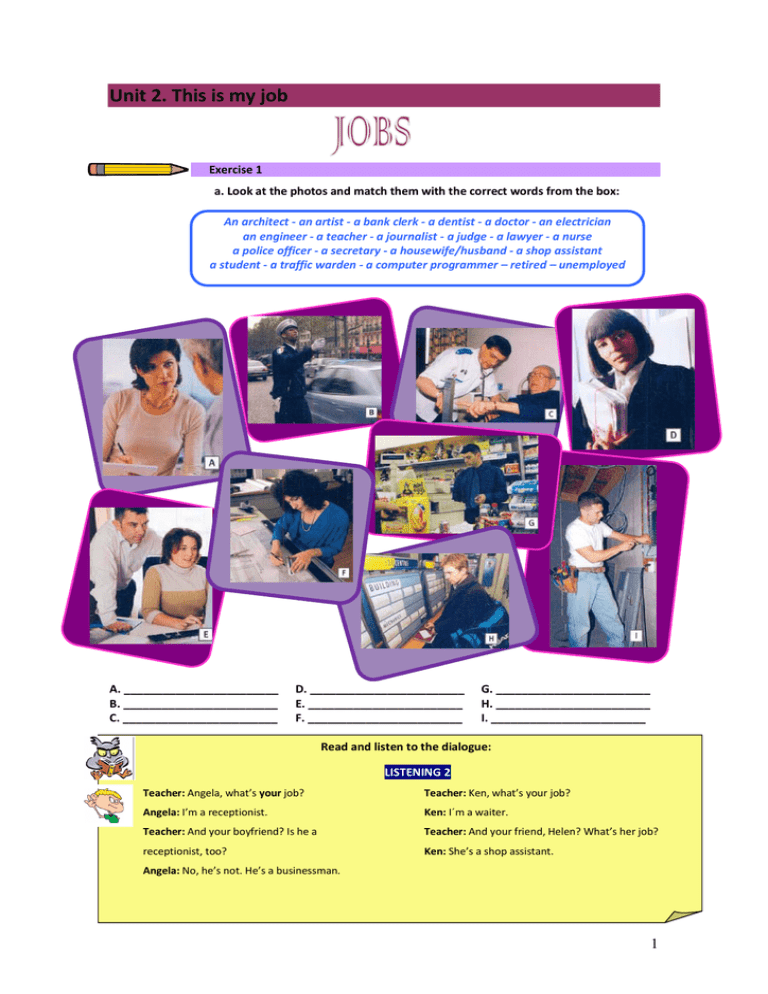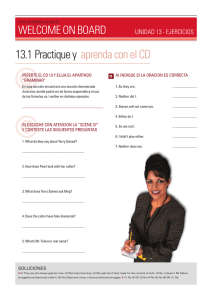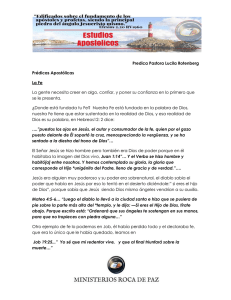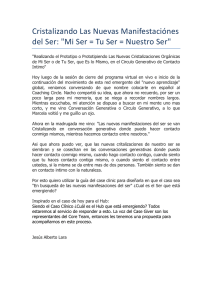Unit 2. This is my job
Anuncio

Unit 2. This is my job Exercise 1 a. Look at the photos and match them with the correct words from the box: An architect - an artist - a bank clerk - a dentist - a doctor - an electrician an engineer - a teacher - a journalist - a judge - a lawyer - a nurse a police officer - a secretary - a housewife/husband - a shop assistant a student - a traffic warden - a computer programmer – retired – unemployed A. ________________________ B. ________________________ C. ________________________ D. ________________________ E. ________________________ F. ________________________ G. ________________________ H. ________________________ I. ________________________ Read and listen to the dialogue: LISTENING 2 Teacher: Angela, what’s your job? Teacher: Ken, what’s your job? Angela: I’m a receptionist. Ken: I´m a waiter. Teacher: And your boyfriend? Is he a Teacher: And your friend, Helen? What’s her job? receptionist, too? Ken: She’s a shop assistant. Angela: No, he’s not. He’s a businessman. 1 Exercise 2 a. Complete the sentences with the correct job. policewoman receptionist doctor waiter hairdresser electrician shop assistant businessman 1 2 3 4 5 6 7 8 1. 2. 3. 4. What’s his job? He’s a _________ What’s her job? She’s a ________ What’s his job? He’s a _________ What’s her job? She’s a ________ 5. 6. 7. 8. What’s her job? She’s a ________ What’s her job? She’s a ________ What’s his job? He’s a _________ What’s his job? He’s an ________ Listen and check your answers LISTENING 3 POSSESSIVE ADJECTIVES ADJETIVOS POSESIVOS This is my daughter. She is in her office. 2 Is this your book? I’ve got their phone number. PERSONAL PRONOUNS PRONOMBRES PERSONALES POSSESSIVE ADJECTIVES ADJETIVOS POSESIVOS I Yo My Mi You Tú Your Tu She Ella Her Su (de ella) He Él His Su (de él) It Ello Its Su (de ello) We Nosotr@s Our Nuestro You Vosotr@s Your Vuestro They Ell@s Their Su (de ellos) Las formas my, your, her, his, its, our, their no cambian. Son las mismas para sustantivos en singular y en plural. e.g. Here’s my book./ Aquí está mi libro. Here are my books./ Aquí están mis libros. La forma its no lleva apóstrofo. e.g. The cat likes its food./ Al gato le gusta su comida. NOT The cat likes it’s food. Exercise 3 a. Complete the sentences with a possessive adjective. 1. My name’s Stephen. 5. We are in Class 3. ______ teacher is Bob. 2. Sara, please turn off ______ mobile phone. 6. She’s French, but ______ mother is English. 3. The students are from Italy. ______ names 7. ______ name’s Ian. He’s from Scotland. are Susanna and Tito. 8. I’m Mike. ______ family are from Dublin. 4. London is famous for ______ red buses. 3 b. Write the questions. 1. you how are ? How are you? 4. from your are where parents ? 2. his what’s name ? 5. surname Zablowski is your ? 3. German mother is her ? 6. spell do how your name you ? A/AN: INDEFINITE ARTICLE A/AN: EL ARTÍCULO INDEFINIDO It’s a present./ Es un regalo. It’s a lovely day./ Hace un día maravilloso. Utilizamos a delante de consonantes. e.g. Are you a doctor? Here’s an orange./ Aquí está una naranja. He’s an old man now./ Él es un anciano ahora. Utilizamos an delante de vocales. e.g. I’m an English teacher. Utilizamos a/an delante de profesiones. e.g. He’s a musician. NOT He’s musician. No utilices a/an con plurales. e.g. They are doctors. NOT They are a doctors. Exercise 4 Complete the sentences using a/an. 1. It’s a new book. 6. He’s ______ waiter. 2. She’s an English teacher. 7. It’s ______ ugly house. 3. Are you ______ student? 8. Here’s ______ ticket for the play. 4. Britain is ______ island. 9. He’s ______ good worker. 5. They are at ______ restaurant. 10. It’s not ______ easy language. 4 PLURAL NOUNS One dog One apple One boy SUSTANTIVOS EN PLURAL ------------------- Two dogs Two apples Two boys Para transformar un sustantivo singular en plural, le añadimos ‘–s’. Los sustantivos que acaban en consonante ‘–y’, cambian la ‘y’ por ‘i’ y añaden ‘–es’. One baby One dictionary ------------- DEMONSTRATIVE ADJECTIVES ADJETIVOS DEMOSTRATIVOS What are those birds? That house is beautiful. This book is really good. Two babies Two dictionaries These chips are cold. CLOSE TO THE SPEAKER FAR FROM THE SPEAKER CERCA DEL HABLANTE LEJOS DEL HABLANTE SINGULAR THIS ESTE THAT ESE PLURAL THESE ESTOS THOSE ESOS Exercise 5 a. Write about the pictures. Use the words in the box: book dictionary cat chair pen apple ______________ ______________ ____________________________________ _________________________ _________________________ 5 ______________ ______________ ____________________________ _________________________ ____________________________ b. Write these sentences in the plural. 1. That waiter is Japanese. _______________________ Those waiters are Japanese. 2. 4. This is a Spanish dictionary. _______________________ _______________________ 3. That student is Greek. 5. What is this? This hairdresser is from England. _______________________ Read the advertisements. 2 1 Receptionist Are you an English teacher? For Doctor’s Surgery Phone: 020 4678 6473 for an interview. Please phone for an interview. Telephone: 020 8549 5632 4 3 WAITER For new London restaurant Age: 18-25 Good for student Telephone: 020 4689 6343 BABYSITTER For 5 year old Please phone Sandra. Telephone: 020 3546 8473 Match the people to the advertisements. Angela Caruso Alberto Romero Carmen Ortega Janet Wilson AGE 23 21 25 35 JOB Student, Receptionist Student, Waiter Student, Babysitter English teacher, writer Italian Spanish Mexican English NATIONALITY 1. Advertisement _____ is for __________ because ____________________________. 2. Advertisement _____ is for __________ because ____________________________. 3. Advertisement _____ is for __________ because ____________________________. 4. Advertisement _____ is for __________ because ____________________________. 6 DAYS OF THE WEEK DÍAS DE LA SEMANA Los días de la semana llevan delante la preposición on. e.g. My birthday is on Monday./Mi cumpleaños es el lunes. Se escriben siempre con letra mayúscula. Para hablar de rutinas y frecuencia les ponemos delante every. e.g. I go to the gym every Thursday./Voy al gimnasio todos los jueves. Para decir el fin de semana, usamos at the weekend. JOBS 1. A student 2. A bank manager 3. A hairdresser 4. A shop assistant 5. A footballer 6. A nurse 7. A doctor 8. An engineer 9. A politician 10. A builder 11. A pilot 12. A lawyer 13. A musician 14. An actor 15. A police officer 16. A receptionist 17. A waiter 18. A secretary 19. A housewife 20. A journalist 21. HE’S RETIRED! 7


